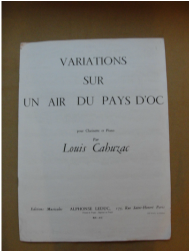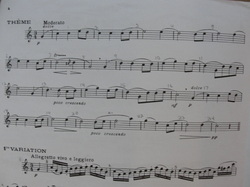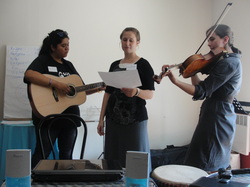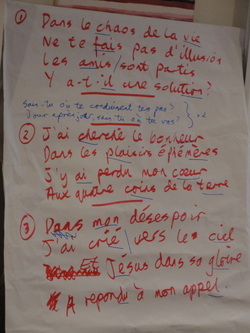
My stand partner Jacques and I before the encore at the clarinet concert.
I returned to France for one final night. In less than 16 hours, I would step off a transatlantic flight, enjoy a fine assortment of French cheeses, tartes and quiches, play in a large concert, say a few more goodbyes, pack most of my possessions into a couple pieces of luggage, sleep an hour and hop on a plane to Berlin.
Even though it was jam-packed, I was thankful to spend one more evening in Toulouse. The concert was the 20th anniversary of the clarinet ensemble, so I got to play with former members of the ensemble and also a guest virtuoso. My French friends were shocked at his improvisation ability. In the Artie Shaw Concerto, he played a lick from "Happy Birthday," and I got plenty of questions about that afterward. Oh, the freedom of jazz music!
A few of my friends who I didn't have the chance to see before I left for Christmas came to the concert. I also saw other friends for one last time (or, until the next time....à la prochaine). I was reminded of just how many wonderful people God put in my path while I lived here.

Some of my many friends who came to my concert. Merci beaucoup !
I didn't start packing until about 10 p.m., but the adrenaline and caffeine helped me to finish the task. I probably spent too much time trying to maximize every last gram of my 23-kg limit, but everything I could bring with me was one less thing to mail.
My roommate Lucy helped me get my luggage from the metro to the airport shuttle. This was no easy task. In the haze of jet lag, I didn't transfer my backpack into my large duffel bag in order to be able to strap it on my back. This meant that the duffel bag was more like a body bag – dead weight!

Yes, it was a little like I had packed a small child in my bag (thanks, Kami, for being my photo illustration from our Kindred days).
Anyways, I barely got my luggage off the bus and into the airport. And if it wasn't for a nice airport employee who watched my luggage while I found a luggage cart, I might have missed my flight trying to kick the duffel bag up an incline to the check-in counter!
All things considered, I had a smooth, short transition from the US to France to Germany. Thank you for however you supported me in Toulouse. I won't forget the chapter of my life story written in France.
If you want to follow the encore of my French experience in Berlin, Germany, visit my new blog,
D. Marie in Germany.
Merci et à bientot en Allemagne !

"Variations Sur Un Air Du Pays D'Oc" was lying on top of my end table when I was looking for clarinet music to practice this summer. I knew I had packed it, but I honestly didn't know much about it.
I played this for a high school contest when the only French I knew was, "bonjour" and "merci." I'm sure my French friends would have been appalled at my Anglicized pronunciation, which would have gone something like, "Vay-rie-ay-shuns suhr unn air doo payz dock."
Now, having lived in France for several months, I knew that pays d'oc was referring to the region of France where Occitan, a dialect, is spoken. Toulouse, the city I was living in, belongs to this language group.

After doing a bit of research, I learned that the composer, Louis Cahuzac, grew up less than two hours from Toulouse and attended the Toulouse conservatory. This piece was based off of a folk tune, Se Canto, originating in the valley of the Garonne (which is the river that runs through Toulouse). I never imagined that I would get so "close" to this music.
How did this high school musician from Minot, ND end up as a 20-something Christian worker in Toulouse, France? God only knows.
He knew long before I even learned to play a clarinet, that I would be called to serve in France. He knew I would become a part of a beautiful community where I could walk alongside and support nationals, learn French and even be given the opportunity to play in a French clarinet ensemble (with clarinetists and teachers from this very same conservatory).
Already, the variations of my life that God has written astonish me. The timid girl who couldn't even raise her hand to use the bathroom became a high school student who loved performing. That young woman became a college student with three majors, who felt called to lead a team of five strangers playing music and doing relational ministry in the US and South America after she graduated. That fledgling leader got broken of entitlement during a 15-month period of underemployment, started a couple ministries with help from friends, organized some renegade trips to serve in Ecuador and China while working full-time and then left it all to move to France.
Now, in my last years of my 20s, I am off to Berlin to tell the stories of what God is doing as Christians unite to seek the welfare of the city. Do I know what this next variation will bring? Not completely. But I know that God writes some incredibly beautiful symphonies out of our brokenness and weaknesses and that His plans are much more extensive and trustworthy than mine.
"'For I know the plans I have for you,' declares the Lord, 'plans for welfare and not for evil, to give you a future and a hope.'" – Jeremiah 29:11

Imagine that every song in church is a bad translation from Chinese in an Eastern style that you don't know how to sing. The songs use metaphors about rice and chopsticks and the Great Wall of China.
It's not that you haven't accepted the Gospel – you have, but it seems that if you want to worship God, you have to give up everything you know from your culture and follow the lead of foreigners.
Although this is just a hypothetical example, the reality is that many well-intentioned missionaries over the years have imported religion from their home cultures. This is most evident in the use of translated songs in churches across the world.
I remember being in a Lutheran church in Colombia, where an entire hymnal had been translated from English to Spanish. The people sang while accompanied by a piano, but it felt like someone had just superimposed Spanish subtitles on an American worship service. Was the Gospel being preached? Yes. Did the hymns speak truth? Yes. Did the congregants identify with the music they were singing? Not so much.
Compare this to an Ecuadorian church I visited where all the songs were written by Latin American artists in a latin style with their instruments. This church was vibrant and full. The congregants sang loudly and weren't afraid to move a little bit. The lyrics spoke to the heart of the Ecuadorian people.

I attended a music workshop in the Normandy region of France last month which addressed these same issues. We discussed how translated music usually either loses something in translation or loses musicality in preserving the original message.
We made a list of styles of music. Out of about 50 styles, three are being used in our churches. We considered issues that the French face and thematic gaps in worship.
During the second half of the workshop, we chose a style, theme and issue and wrote a song. Pictured left are the lyrics to the Christian reggae song that we wrote.
The song addresses searching for meaning in the midst of hardship. The chorus asks questions. The lyrics are quite poetic and philosophical. We chose not to mention Jesus until the very last verse, so that a non-believer would identify and listen to the song. We did our best to avoid "Christianese" – or words used commonly among in Christian circles – that can often make those on the outside feel excluded. The finished product felt very French.
This fall, our team will be partnering with French and European church planters to see a new church planted in a neighborhood untouched by the Gospel. I am challenged by this conference to seek out French music by French artists to be used in worship – and if there are gaps, to work with French nationals to create songs that the people will sing.

I mentioned in my last post that the Toulouse clarinet ensemble that I play with was taped during two of our performances at the open air festival. Well today the director sent us all a link to one of the videos about the festival.
You can see and hear our ensemble play and also take in the sights and sounds of the day. One of goals of the day was to get people back in touch with the earth and agriculture. There were nature walks and various activities (you can even watch little kids make brioches).
The video is all in French, so for those of you who are francophones or just want to listen to the language, have fun! The music, of course, is a language of its own :).








 RSS Feed
RSS Feed